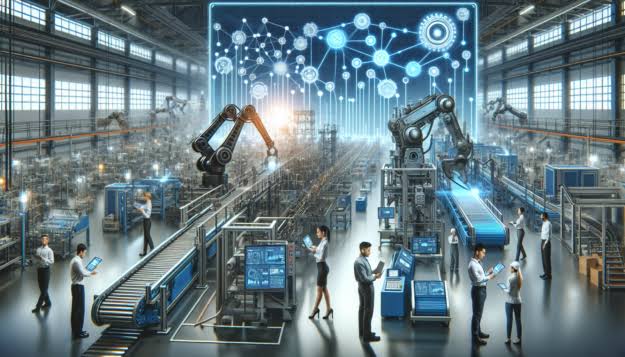Introduction
Fabrikanlagen, or manufacturing plants, play a critical role in the industrial sector. These facilities are designed for the efficient production of goods, ranging from automobiles to electronics and consumer products. Understanding how to optimize and maintain Fabrikanlagen can significantly enhance your business’s productivity and profitability.
What is a Fabrikanlage?
A Fabrikanlage, commonly known as a manufacturing plant, is a facility where raw materials are transformed into finished products through various processes such as machining, assembly, and packaging. These plants are equipped with machinery, tools, and equipment necessary for large-scale production.
Importance of Fabrikanlagen in Modern Industry
Fabrikanlagen are the backbone of modern industry. They enable mass production, which drives down costs and makes goods more affordable for consumers. Efficient Fabrikanlagen also contribute to economic growth by creating jobs and fostering technological advancements.
Key Components of a Fabrikanlage
Machinery and Equipment
The core of any Fabrikanlage is its machinery and equipment. This includes everything from conveyor belts and robotic arms to CNC machines and 3D printers. The choice of machinery depends on the type of products being manufactured.
Layout and Design
The layout of a Fabrikanlage is crucial for maximizing efficiency. A well-designed layout minimizes the distance materials need to travel and reduces the time workers spend moving between workstations. This can significantly boost productivity and lower operating costs.
Human Resources
Skilled labor is essential for operating and maintaining a Fabrikanlage. This includes engineers, technicians, and assembly line workers who ensure that production runs smoothly.
Planning and Designing a Fabrikanlage
Site Selection
Choosing the right location for a Fabrikanlage is vital. Factors to consider include proximity to suppliers and customers, availability of skilled labor, and access to transportation networks.
Environmental Considerations
Modern Fabrikanlagen must comply with environmental regulations. This involves implementing sustainable practices such as waste reduction, energy efficiency, and pollution control.
Technological Integration
Integrating advanced technologies such as automation, IoT (Internet of Things), and AI (Artificial Intelligence) can greatly enhance the efficiency of a Fabrikanlage. These technologies help monitor and control production processes in real-time.
Optimizing Fabrikanlagen for Maximum Efficiency
Lean Manufacturing
Lean manufacturing principles focus on eliminating waste and improving efficiency. This includes techniques such as Just-In-Time (JIT) production, which reduces inventory costs, and Kaizen, which encourages continuous improvement.
Six Sigma
Six Sigma is a data-driven approach to improving quality by identifying and eliminating defects in the production process. Implementing Six Sigma in a Fabrikanlage can lead to significant improvements in product quality and customer satisfaction.
Maintenance Strategies
Regular maintenance is crucial for keeping machinery and equipment in optimal condition. This includes preventive maintenance, which involves routine inspections and repairs, and predictive maintenance, which uses data analytics to predict and prevent equipment failures.
Benefits of Efficient Fabrikanlagen
Cost Savings
Efficient Fabrikanlagen can significantly reduce production costs. This is achieved through lower energy consumption, reduced waste, and improved labor productivity.
Increased Production Capacity
By optimizing processes and utilizing advanced technologies, Fabrikanlagen can increase their production capacity without the need for additional resources.
Enhanced Product Quality
Implementing quality control measures and advanced manufacturing techniques ensures that products meet high standards, leading to increased customer satisfaction and brand loyalty.
Challenges in Managing Fabrikanlagen
Technological Advancements
Keeping up with rapid technological advancements can be challenging. Investing in the latest technologies and training employees to use them effectively is crucial for maintaining competitiveness.
Supply Chain Disruptions
Supply chain disruptions can significantly impact the efficiency of a Fabrikanlage. Developing a robust supply chain strategy and maintaining good relationships with suppliers can help mitigate these risks.
Regulatory Compliance
Compliance with environmental and safety regulations is essential for operating a Fabrikanlage. Failure to comply can result in hefty fines and damage to the company’s reputation.
Future Trends in Fabrikanlagen
Smart Manufacturing
The integration of IoT, AI, and big data is transforming Fabrikanlagen into smart factories. These technologies enable real-time monitoring and control of production processes, leading to increased efficiency and flexibility.
Sustainable Manufacturing
Sustainability is becoming a key focus in manufacturing. Future Fabrikanlagen will likely prioritize renewable energy sources, waste reduction, and eco-friendly production processes.
Customization and Flexibility
As consumer demand shifts towards personalized products, Fabrikanlagen need to be more flexible and capable of producing customized goods efficiently.
Conclusion
Fabrikanlagen are essential for modern industry, driving economic growth and technological advancements. By focusing on efficiency, quality, and sustainability, businesses can unlock the full potential of their manufacturing plants and gain a competitive edge in the market.
FAQs
What is a Fabrikanlage?
A Fabrikanlage is a manufacturing plant where raw materials are transformed into finished products through various processes.
Why are Fabrikanlagen important?
Fabrikanlagen enable mass production, reduce costs, create jobs, and drive economic growth.
What factors are crucial in the design of a Fabrikanlage?
Key factors include site selection, environmental considerations, technological integration, and layout design.
How can a Fabrikanlage be optimized for efficiency?
By implementing lean manufacturing, Six Sigma, and regular maintenance strategies, a Fabrikanlage can achieve maximum efficiency.
What are the benefits of an efficient Fabrikanlage?
Benefits include cost savings, increased production capacity, and enhanced product quality.
What are the future trends in Fabrikanlagen?
Future trends include smart manufacturing, sustainable practices, and increased customization and flexibility.
